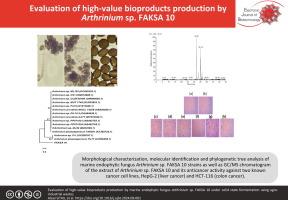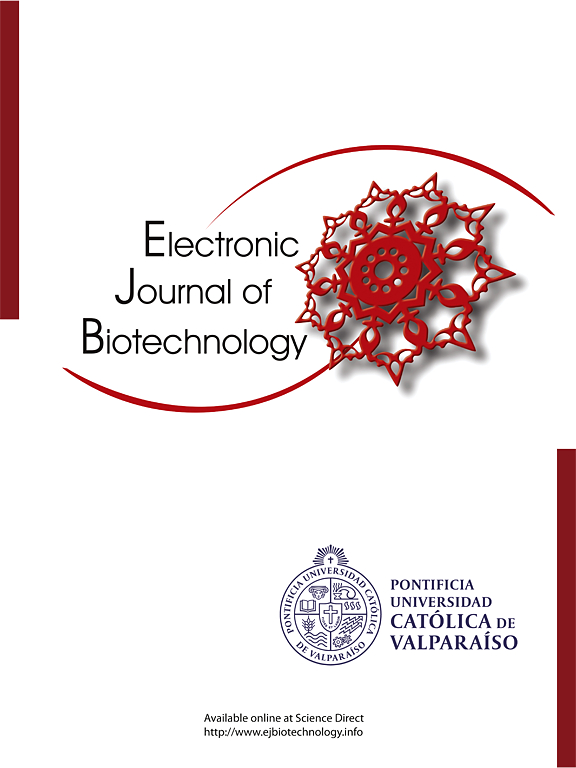评估海洋内生真菌 Arthrinium sp. FAKSA 10 在固态发酵条件下利用农业工业废弃物生产高价值生物产品的情况
IF 2.5
4区 生物学
Q3 BIOTECHNOLOGY & APPLIED MICROBIOLOGY
引用次数: 0
摘要
背景为了应对公共卫生挑战,人们越来越关注从非常规来源获取生物活性代谢物,用于副作用最小的癌症和病毒靶向治疗。内生真菌在这些疗法中大有可为。本研究的重点是利用低成本培养基和优化的发酵系统,最大限度地提高这些真菌的生物活性物质产量。结果在麦麸培养基上培养了从多触角杉中分离出的 43 种内生真菌,并在固态发酵条件下对其生物活性代谢物进行了评估。被鉴定为 Arthrinium sp. FAKSA 10 的菌株表现出最高水平的药物代谢物,包括 L-谷氨酰胺酶、L-蛋氨酸酶、L-精氨酸酶、L-天冬酰胺酶、L-酪氨酸酶、L-赖氨酸α-氧化酶和核糖核酸酶,其丙型肝炎病毒抑制率为 79.12%。该菌株产生了 46 种具有抗癌、抗氧化、抗病毒和细胞毒性特性的代谢物,包括十六烷酸甲酯、十六烷酸乙酯、9, 12-十八碳二烯酸(Z, Z)甲酯、9-十八碳二烯酸(Z)-甲酯和 11, 14-二十碳二烯酸甲酯等主要化合物。使用 11 种农用工业残留物是一种具有成本效益的策略,随后对固态发酵系统进行了优化。这一优化提高了酶产量,并增强了抗病毒和抗氧化活性。固态发酵的最佳条件是 10 d 培养、1 mm 粒径、60% 初始水分、28 °C 温度和 2 × 107 CFU/mL 接种物大小。在各种残留物中,油饼是一种有效且具有成本效益的培养基,能够显著提高有价值的生物活性代谢物的产量:Evaluation of high value bioproducts production by marine endophytic fungus Arthrinium sp. FAKSA 10 under solid state fermentation using agro-industrial wastes.Electron J Biotechnol 2024;73. https://doi.org/10.1016/j.ejbt.2024.09.001.本文章由计算机程序翻译,如有差异,请以英文原文为准。

Evaluation of high-value bioproducts production by marine endophytic fungus Arthrinium sp. FAKSA 10 under solid state fermentation using agro-industrial wastes
Background
To address public health challenges, there is increasing interest in bioactive metabolites from unconventional sources for targeted cancer and viral treatments with minimal side effects. Endophytic fungi are promising for these therapies. This study focused on maximizing bioactive agent yields from these fungi using a low-cost medium and optimized fermentation system.
Results
Forty-three endophytic fungi isolated from Sinularia polydactyla were cultivated on wheat bran medium and evaluated for bioactive metabolites under solid-state fermentation. Strain FAKSA 10, identified as Arthrinium sp. FAKSA 10, exhibited the highest levels of pharmaceutical metabolites, including L-glutaminase, L-methioninase, L-arginase, L-asparaginase, L-tyrosinase, L-lysine α-oxidase, and ribonuclease, with a 79.12% hepatitis C virus knockdown rate. This strain produced 46 metabolites with anticancer, antioxidant, antiviral, and cytotoxic properties, including major compounds like hexadecanoic acid methyl ester; hexadecanoic acid ethyl ester; 9, 12-octadecadienoic acid (Z, Z), methyl ester; 9-octadecenoic acid (Z)-, methyl ester, and 11, 14-eicosadienoic acid, methyl ester. A cost-effective strategy using 11 agro-industrial residues was applied, followed by optimization of the solid-state fermentation system. This optimization increased enzyme yields and enhanced antiviral and antioxidant activities. The optimal conditions for solid-state fermentation were a 10 d incubation, 1 mm particle size, 60% initial moisture, 28 °C temperature, and 2 × 107 CFU/mL inoculum size.
Conclusions
This study exploited Arthrinium sp. FAKSA 10 metabolites as natural pharmaceuticals against cancer and viral diseases, highlighting their significant antioxidant properties. Among various residues, oil cakes emerged as an effective and cost-efficient medium, capable of significantly enhancing the production of valuable bioactive metabolites.
How to cite: Alsarraf MJ, Ameen F, Alfalih A, et al. Evaluation of high-value bioproducts production by marine endophytic fungus Arthrinium sp. FAKSA 10 under solid state fermentation using agro-industrial wastes. Electron J Biotechnol 2024;73. https://doi.org/10.1016/j.ejbt.2024.09.001.
求助全文
通过发布文献求助,成功后即可免费获取论文全文。
去求助
来源期刊

Electronic Journal of Biotechnology
工程技术-生物工程与应用微生物
CiteScore
5.60
自引率
0.00%
发文量
50
审稿时长
2 months
期刊介绍:
Electronic Journal of Biotechnology is an international scientific electronic journal, which publishes papers from all areas related to Biotechnology. It covers from molecular biology and the chemistry of biological processes to aquatic and earth environmental aspects, computational applications, policy and ethical issues directly related to Biotechnology.
The journal provides an effective way to publish research and review articles and short communications, video material, animation sequences and 3D are also accepted to support and enhance articles. The articles will be examined by a scientific committee and anonymous evaluators and published every two months in HTML and PDF formats (January 15th , March 15th, May 15th, July 15th, September 15th, November 15th).
The following areas are covered in the Journal:
• Animal Biotechnology
• Biofilms
• Bioinformatics
• Biomedicine
• Biopolicies of International Cooperation
• Biosafety
• Biotechnology Industry
• Biotechnology of Human Disorders
• Chemical Engineering
• Environmental Biotechnology
• Food Biotechnology
• Marine Biotechnology
• Microbial Biotechnology
• Molecular Biology and Genetics
•Nanobiotechnology
• Omics
• Plant Biotechnology
• Process Biotechnology
• Process Chemistry and Technology
• Tissue Engineering
 求助内容:
求助内容: 应助结果提醒方式:
应助结果提醒方式:


